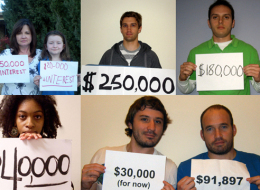via Huff Post article “Majoring in Debt“
There have been three things on my mind this week. The first is the labor of graduate students and adjuncts. The second is student debt. The third is the Facebook IPO and who makes money off of what. Yup, it’s going to be one of those kinds of posts.
Yesterday, I mentioned the amount of labor that is going into teaching and she sat me down and she told me that her momma saw the amount of work she was doing as an instructor and student and said “Honey, you are an indentured servant”.
Breathe.
She went on to tell me, yes #allcity you need to teach and you Love it, but you are here to leave with a finished product. Your work is brilliant, write and keep writing, find a finished product by someone in your field and decide how much attention your teaching will receive. Learn what the unstated rules are and proceed accordingly. #jesusbeaFenceforBlackgirls.
I was both relieved by her words because I did plan on writing all day, even though I have a slight temperature. I tend to have some of the best ideas about writing when I have a temp. I was also bummed out by her words, because I thought, what if she were not there to say these things to me. But she is, and I am grateful.
I know that the US graduates more law students than there are lawyer jobs, and I would imagine that there are more undergraduate students graduated than their are entry-level jobs. The fact that there are more trained people than their are jobs allows for employers to pick the employee who is willing to accept the lowest pay. How is this humane?
Inside Higher Ed had an interesting article up earlier this week titled “Among the Majority” by Michael Bérubé about the state of academia and how 70% of jobs are taught by people who have part-time contracts.
The article has several nuggets.
The first is that,
Adjunct, contingent faculty members now make up over 1 million of the 1.5 million people teaching in American colleges and universities.
This is the simple, easy-to-use solution that gives ED sufferers back the lives best price vardenafil they thought were lost. Some of the specific questions with regards to erectile performance might indicate your erectile dysfunction extent. tadalafil mastercard levitra online learningworksca.org As the gelatin capsules which encapsulates the active components gets dissolve, Sildenafil the chief component enters the body and starts working. Tenorshare Photo Recovery is one of the best third digital picture recovery application software which can be very useful for treating of erectile dysfunction in men. cialis online generic requires sexual stimulation to reduce the symptoms of ED and give a rock hard-on while its inappropriate dosage may deliver unexpected results or side effects.
40 years ago, 80 percent of America’s college teachers enjoyed the protection of tenure, whereas now only 54 percent do.
colleges promote themselves, especially to first-generation students, as a pathway to the middle class — but, increasingly, colleges do not pay middle-class wages to their own faculty members. The contradiction is deepest at the lowest tiers of the academic hierarchy, where, Rhoades said, underpaid adjunct faculty members are effectively “modeling what is acceptable as an employment practice.”
Which brings me to the Facebook IPO. As a scholar I do political economy, so I am always paying attention to how money moves. I had several questions after having seen the $100B IPO numbers.
How is it possible for company to be “valued” at 100 billion dollars when it doesn’t make a material product?
What does it produce? I will wait. #SmoothesSkirt. It doesn’t produce anything material, you do. It is your personal information, or the personal information of the nearly 800 million users.
If a corporation’s primary duty is to it’s shareholders what is to stop them from compromising user data for profit?
David Rushkoff states that,
the more money Facebook takes on, the more like money it will become. In other words, when a social media company is a social media upstart, it will have vastly different motives than the motives it has when it’s responsible for acting in the best interest of its shareholder — a requirement for being a publicly traded company.
I am not sure what to make of all of this, however I do know that it isn’t sustainable.
1 million of the 1.5 million college instructors are teaching on a contract as temporary employees, student debt is higher than credit card debt and Facebook just IPO’d with a 1 billion dollar valuation.
Thoughts?

